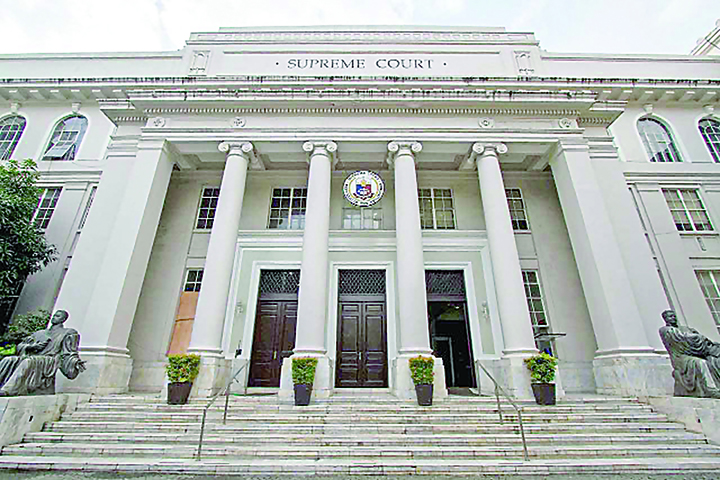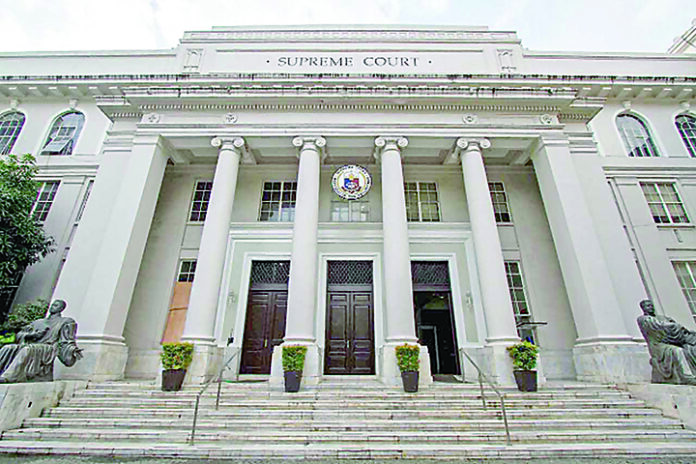
THE Supreme Court will resume on Tuesday (February 9) the debate on the 37 petitions seeking to declare unconstitutional the provisions of the Anti-Terrorism Act (ATA) of 2020.
During last week’s start of the oral arguments on the petitions, several justices had started grilling the lawyers who were tasked to raise the issues under six clusters.
After the petitioners, the SC will hear the oral arguments of Solicitor General Jose Calida, who represents the government officials named as respondents in the petition — Executive Secretary Salvador Medialdea, National Security Adviser Hermogenes Esperon, Foreign Affairs Secretary Teodoro L. Locsin Jr., National Defense Secretary Delfin Lorenzana, Interior and Local Government Secretary Eduardo Año, Finance Secretary Carlos Dominguez III, Justice Secretary Menardo Guevarra, Information and Communications Technology Secretary Gregorio Honasan II, Anti-Money Laundering Council Executive Director Mel Georgie Racela, Budget and Management Secretary Wendel Avisado, the Anti-Terrorism Council, and the National Intelligence Coordinating Agency (Nica).
Calida is expected to ask the magistrates to dismiss the petitions outright on the ground of lack of jurisdiction.
He had insisted that the petitions raised factual issues which are not within the SC’s jurisdiction since it is not a trier of facts.
Most of the petitions had sought the Court’s issuance of a temporary restraining order to immediately enjoin ATA’s implementation.
However, Chief Justice Diosdado Peralta had said the SC will resolve the pleas for TRO once the oral arguments are terminated.
The Court also announced that only authorized lawyers and their staff are allowed inside the main session hall.
Those waiting for their turn to argue are cloistered in the division session hall where monitors were set up.
Mediamen are allowed to enter the SC premises during the oral arguments provided they show proof of a negative Covid RT-PCR test result taken within 72 hours prior to the oral arguments.
The issues raised by the petitioners were divided into six clusters.
Cluster 1 focuses on the preliminary issues such as whether the petitioners have legal standing to sue and if Anti-Terrorism Act (ATA) or Republic Act 11479 should be declared unconstitutional in its entirety if the Court finds the definition of terrorism as well as the powers of the Anti-Terrorism Council (ATC) are constitutionally infirm.
Cluster 2 is on whether facial challenge is proper; and if the definition of “terrorism” in Section 4 is void for being vague and overbroad, and thus in violation of constitutional rights such as free speech and expression.
Former Solicitor General Jose Anselmo Cadiz, human-rights lawyer Jose Diokno and Lawyer Alfredo Molo argued for clusters 1 and 2.
The petition also asks if Section 5-14 defining and penalizing threats to commit terrorism and others are void for vagueness and overbroad and violate constitutional rights.
Cluster 3 raises the questions on whether the powers of the ATC are unconstitutional. Issues under this cluster were assigned to lawyer Evalyn Ursua.
Lawyer Neri Colmenares argued on the issues under Cluster 4—whether Section 16 violates the constitutional rights to due process and against unreasonable searches and seizures, privacy of communication and freedom of speech and freedom of religion.
Cluster 5, which inquires about the ATC’s power to detain without judicial warrant based on mere suspicion, was tackled by Rep. Edcel Lagman.
Cluster 6 is about whether RA 11479 violates the Indigenous People and Moro’s rights to self-determination and self-governance under the Constitution. This was argued by lawyer Algamar Latiph.
Read full article on BusinessMirror

